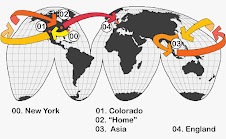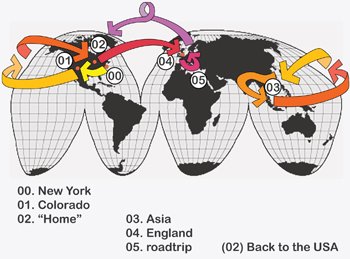Megan recently found a travelog from a guy doing the 'grand tour' of Europe on less than 100 euros a day. While this blog was interesting in and on its own rite, there was a secondary conversation that spurred me thinking about the taboo subject of appearing American, at least within many Americans minds.
The whole conversation really revolved around the concept of wearing blue jeans while on the author's three month tour and the reaction of many readers of 'Oh how American!' Which also could be read as 'Oh how stereotypically American, how ugly American, how obtuse.' From there the conversation then spread out to other cultural clothing dos and don'ts. All of which involved the basic process of shedding American dress (and clothing identity as such) in order to embrace a European appearance. And I realised that as I read through the article, the (many) responses and opinions, that I'm not interested in 'blending in' any more, as such.
I'm not sure why this sudden revelation, perhaps its living abroad, perhaps its becoming proud of being an American, perhaps its finally just learning to not care what judgments other people have based upon my nationality. I'm still highly concerned to dress and appear culturally appropriate and unoffensive however, I'm less interested in things like... trying to get asked directions (a sure sign of clothing assimilation). I've suddenly become ok wearing a baseball cap in public, wearing my sandals when I want, and being ok as an American living in Brittan. I wonder if I've reached a new understanding and place of cultural acceptance, if I'm now ok breaking cultural rules and norms, as I see fit surely that marks some kind of change.
Although even as I write its not as though I changed my appearance much when we arrived, but at least I thought about it. Now... eh, now its another place I've lived and I'll dress as I like and as seems fitting.
Monday, June 09, 2008
Appearing American
Posted by
joshwall
at
9:46 AM
![]()
Subscribe to:
Post Comments (Atom)


6 comments:
Apparently, your language doesn't want to stand out as American. "Realised"? How terribly British of you! :)
Writing has been a weird thing to figure out how I want to do it. But since I have to write essays with British English, I try to write everything else in it as well for consistency. Except when I was applying for jobs back in the states and then I had to read through for American grammar... which just felt weird.
I think it's good to hang on to some "Americanisms" - it is what makes you you. Also, when you go back to live in the US, you will both probably retain some of the Britishness that you have picked up here and that will define who you are in the future. For example, my parents spent some time living in Scotland around the time I was born, and although neither of them is Scottish they still come out with odd phrases which I love!
Emma, I hope I hold onto both... I like feeling that I can use the phrase 'bits and bobs' or 'cheers' and not feel stupid about it. Hmmm... this has spurred other thoughts as well, maybe language deserves its own post...
Josh, you should write an essay on it! There's quite a lot on the web - I just found this wikipedia article http://en.wikipedia.org/wiki/American_and_British_English_differences.
Emma, I've actually used that entry for practical purposes! Mostly it's fine that everyone at work knows I'm an American, but sometimes it gets difficult getting ideas across in emails, especially if I am emailing something more technical to someone out of the office. I think we use words just differently enough to cause some confusion!
I'm actually still surprised to come across an 'English' word about weekly. I keep my own private 'English:American architectural terms' dictionary here....
As for being American, Josh has always been less inhibited than I, so he's never 'cared' as much as I have about how people view him, but it is nice to feel comfortable enough not to care. I think traveling in Asia, where we had absolutely no option of appearing native, helped begin the process.
Post a Comment